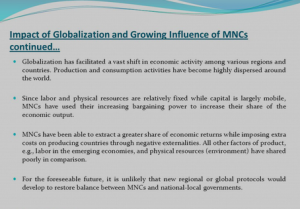Globalization has a profound impact on multinational corporations (MNCs), influencing various aspects of their strategies, operations, and overall business environment. The purpose of this study is to analyze the impact of globalization on multinational corporations.

Impact Of Globalization On Multinational Corporations
Table of Contents
Toggle1. Market Expansion:
- Opportunities for Growth: Globalization provides MNCs with opportunities to expand their market reach beyond domestic borders, tapping into new and diverse consumer markets.
- Access to Emerging Economies: MNCs can explore and establish a presence in emerging economies, capitalizing on the growth potential in regions with expanding consumer markets.
2. Supply Chain and Production:
- Global Supply Chains: MNCs often develop complex global supply chains, optimizing production costs and efficiency by sourcing materials and components from different countries.
- Outsourcing and Offshoring: Globalization facilitates outsourcing and offshoring of various business functions, allowing MNCs to benefit from cost advantages and specialized skills in different regions.
3. Technology and Innovation:
- Knowledge Transfer: MNCs leverage global talent pools and engage in knowledge transfer across borders, fostering innovation and technological advancements.
- Research and Development (R&D) Collaboration: Collaboration with international partners and research institutions enhances MNCs’ R&D capabilities, leading to innovations and product development.
4. Regulatory Environment:
- Navigating Varied Regulations: Globalization exposes MNCs to diverse regulatory environments, requiring them to navigate different legal systems, trade regulations, and compliance standards in each country of operation.
- Compliance Challenges: MNCs face challenges in ensuring compliance with a myriad of regulations, ranging from labor laws to environmental standards.
5. Cultural Sensitivity:
- Adapting to Cultural Differences: MNCs must adapt their products, marketing strategies, and management approaches to accommodate cultural differences in various markets.
- Diversity and Inclusion: Managing a culturally diverse workforce becomes crucial, requiring policies and practices that promote diversity, equity, and inclusion.
6. Financial Considerations:
- Currency Exchange and Hedging: MNCs face currency exchange risks and engage in hedging strategies to manage fluctuations in exchange rates.
- Tax Planning: Strategic tax planning becomes essential for MNCs to optimize their global tax liabilities and manage taxation complexities across different jurisdictions.
7. Competition:
- Global Competitive Landscape: Globalization intensifies competition as MNCs compete with local and international rivals. This necessitates continuous innovation, cost efficiency, and strategic differentiation.
- Strategic Alliances and Mergers: MNCs may form strategic alliances or engage in mergers and acquisitions to strengthen their competitive position globally.
8. Human Resources:
- Cross-Cultural Training: Human resource management in MNCs includes cross-cultural training programs to help employees adapt to different work environments and enhance cultural intelligence.
9. Political and Economic Stability:
- Political Risks: MNCs are exposed to political risks in different regions, including geopolitical tensions, regulatory changes, and government instability.
- Economic Interdependence: Economic interdependence increases as MNCs operate in multiple countries, making them susceptible to changes in the global economy.
10. Environmental Sustainability:
- Global Environmental Impact: MNCs are under pressure to address environmental sustainability issues on a global scale, including reducing carbon footprints and adopting sustainable business practices.
Conclusion:
Globalization significantly shapes the landscape for multinational corporations, presenting both opportunities and challenges. Successful adaptation to the realities of globalization is crucial for MNCs seeking sustainable growth and competitiveness in an interconnected world.
